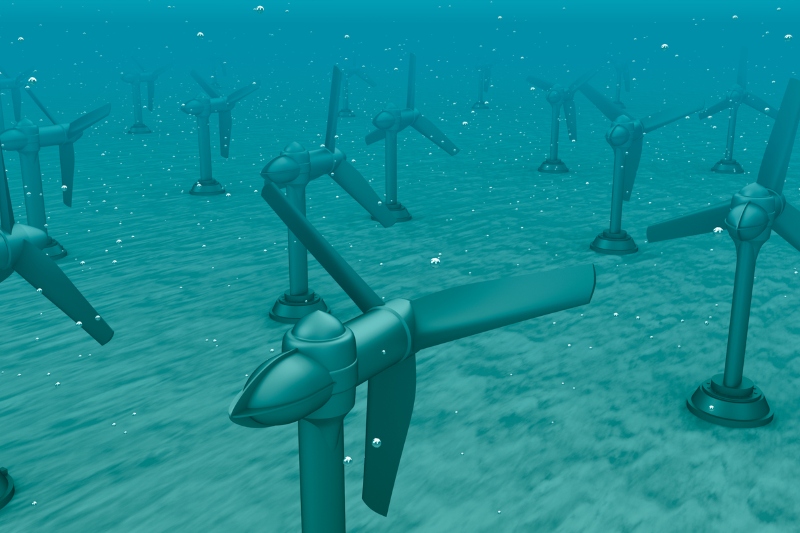


In a joint effort to advance renewable energy development, HydroWing, a division of the Inyanga Marine Energy Group, has partnered with Indonesia's state-owned power company PLN to construct a 10MW tidal current power plant in East Nusa Tenggara. This marks the first project of its kind in Indonesia and highlights the country's potential in tidal energy. With both companies bringing their expertise to the table, this project will contribute to Indonesia's transition to Net Zero and provide affordable, 24/7 renewable energy.
Indonesia Embraces Tidal Power: 10MW Plant to Boost Renewable Energy
Indonesia has taken a significant step towards harnessing the immense potential of tidal energy with the launch of a joint venture between HydroWing and state-owned power company PLN. Aiming to construct a 10MW tidal current power plant in East Nusa Tenggara, this collaboration marks a milestone in Indonesia's transition to renewable energy.
Background on Tidal Energy in Indonesia
Indonesia, with its extensive coastline and vast tidal range, possesses significant potential for tidal energy generation. The country's archipelago geography creates numerous sites with strong tidal currents, making it an ideal location for this clean and sustainable source of power.
The HydroWing-PLN Partnership
HydroWing, a division of the Inyanga Marine Energy Group, brings expertise in tidal turbine design and deployment. PLN, on the other hand, has extensive experience in electricity generation and distribution throughout Indonesia.
This partnership combines the strengths of both companies, leveraging their technical know-how and local knowledge. The 10MW project is expected to provide affordable, reliable, and renewable energy to the region, significantly contributing to Indonesia's Net Zero target.
Top 5 FAQs on Tidal Energy in Indonesia
1. What is tidal energy?
Tidal energy is a renewable energy source that harnesses the power of tides to generate electricity.
2. Why is tidal energy important for Indonesia?
Indonesia's vast coastline and tidal range make it an ideal location for tidal energy development. This can help reduce dependence on fossil fuels and contribute to energy security.
3. How does the HydroWing-PLN project differ from previous tidal energy initiatives in Indonesia?
This project is the first of its kind in Indonesia, featuring a large-scale 10MW tidal current power plant. It will serve as a model for future tidal energy development in the country.
4. What are the benefits of tidal energy?
Tidal energy is a clean, sustainable, and predictable source of power that can generate electricity 24/7. It also has a minimal environmental impact.
5. What is the future of tidal energy in Indonesia?
Indonesia has immense potential for tidal energy development. This project marks the beginning of a promising industry that can contribute significantly to the country's renewable energy goals.

The Telangana Southern Power Distribution Company Limited (TGSPDCL) has introduced "Currentolla Praja Baata" in Nalgonda, Medak, Mahabubnagar, Ranga Reddy, and Hyderabad, aimed at enhancing power distribution in the region. Led by CMD Musharraf Faruqui, the initiative will involve over 9,500 employees who will personally visit different areas to interact with consumers and address complaints. This program hopes to minimize power losses, strengthen the network, and improve the quality and reliability of power supply in Telangana.

A new Randstad India report reveals insights about India's youngest workforce cohort and their expectations for their careers. Gen Z prioritizes financial security, flexibility, and a sense of purpose in their job, requiring employers to go beyond just providing a decent salary. With a preference for a combination of a full-time job and a side hustle, Gen Z's mobility is driven by the pursuit of growth, making it crucial for employers to invest in continuous learning and foster inclusive cultures to retain this transformative generation.

According to Randstad India's latest report, young professionals in India are redefining workplace norms by prioritizing factors like pay, flexibility, and personal values. The report also reveals that Gen Z values continuous learning through AI tools and is more concerned about the impact of AI on job security. This calls for businesses to adapt to changing preferences and attract the next generation of talent by offering a mix of technical excellence and personal autonomy. The findings also emphasize the need for inclusive cultures and flexible policies in order to build resilient, future-ready businesses.

With the Gen-Z workforce making up about 27% of India's population, companies are struggling to retain this energetic cohort. A recent report by Randstad highlights the need for a change in mindset from employers towards the Gen-Zs. While they have long-term aspirations, they are also quick to move on to new opportunities if they feel undervalued or underpaid. This poses a challenge for employers who must find ways to keep this ambitious and driven generation engaged and progressing within their organizations.

Union Home Minister and Minister of Cooperation, Amit Shah, congratulated Amul and Indian Farmers Fertiliser Cooperative Limited (IFFCO) for securing the first and second ranks in the global ranking for cooperatives. This achievement is a testament to the boundless potential of cooperatives, which are being transformed into a global model of empowerment and self-reliance by Prime Minister Narendra Modi. The dairy sector, which is the backbone of rural livelihoods in India, has combined farmer-led cooperatives, women's participation and scientific practices to achieve remarkable progress. Additionally, the National Co-operative Exports Limited, set up by the government, has achieved a significant milestone in exporting agricultural commodities.

After purchasing his retirement property in Swansea, David Barlow has been forced to live in a motorhome on his driveway due to persistent damp and mould issues. Despite complaints to his property managers, the issue has not been resolved and Barlow fears for his belongings. The problem is believed to have been caused by faulty insulation installed by British Gas, but the company denies responsibility. This situation has put a hold on Barlow's retirement plans and has left him feeling frustrated and stuck.

US-based private equity firm Tillman Global Holdings (TGH) is reportedly in advanced discussions to invest up to $6 billion in Vodafone Idea Ltd, which could lead to a change in operational control. However, the investment is contingent on the Indian government providing comprehensive relief covering AGR and spectrum payment dues. If the deal goes through, it could dilute existing promoter holdings, including those held by Aditya Birla Group and Vodafone Plc. While the news has boosted investor sentiment, analysts caution that government approval and debt restructuring clarity are key to the execution of the deal.

The Indian real estate market is undergoing a major shift with rising home prices, as apartments priced between Rs 2 crore and Rs 5 crore now dominate sales. This change has been highlighted by a Redditor who expressed concerns over the dwindling chances of middle-class buyers to afford a house. According to a Moneycontrol report, the trend is a result of big developers focusing more on luxury projects, leaving affordable housing in the backseat. As a result, home ownership for the middle-class seems like a distant dream, with even government employees struggling to afford these expensive properties.

Vodafone Idea's share price saw a significant increase of 14% after the Supreme Court provided further clarity on the AGR dues issue. The court clarified that the government can consider providing relief for both additional and reassessed AGR dues, giving some respite to the struggling telecom operator. At the time of writing, Vodafone Idea's share price was trading at Rs 9.51, with a gain of 8.93%. This comes after the court's previous hearing which did not provide a clear ruling on whether the relief applies to only Vodafone Idea's plea or the entire pending AGR amount of nearly Rs 80,000 crore.

After failing to meet Apple's internal sales expectations, the ultra-thin iPhone Air is facing a significant production cut of 80%. The initial prediction of reducing production by one million units has now been deemed insufficient, highlighting deeper concerns about the device's market performance. This setback raises questions about the competitive landscape of high-end smartphones and hints at Apple's next possible move towards a foldable iPhone.